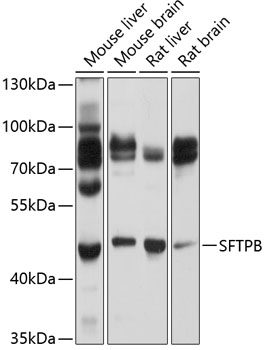Anti-SFTPB Antibody (CAB1748)
- SKU:
- CAB1748
- Product type:
- Antibody
- Reactivity:
- Human
- Reactivity:
- Mouse
- Reactivity:
- Rat
- Host Species:
- Rabbit
- Isotype:
- IgG
- Antibody Type:
- Polyclonal Antibody
- Research Area:
- Cell Biology
Frequently bought together:
Description
| 抗体名: | Anti-SFTPB Antibody |
| 抗体コード: | CAB1748 |
| 抗体サイズ: | 20uL, 50uL, 100uL |
| 申し込み: | WB |
| 反応性: | Human, Mouse, Rat |
| 宿主種: | Rabbit |
| 免疫原: | Recombinant fusion protein containing a sequence corresponding to amino acids 94-393 of human SFTPB (NP_000533.3). |
| 申し込み: | WB |
| 推奨希釈: | WB 1:500 - 1:2000 |
| 反応性: | Human, Mouse, Rat |
| ポジティブサンプル: | Mouse liver, Mouse brain, Rat liver, Rat brain |
| 免疫原: | Recombinant fusion protein containing a sequence corresponding to amino acids 94-393 of human SFTPB (NP_000533.3). |
| 精製方法: | Affinity purification |
| ストレージバッファ: | Store at -20'C. Avoid freeze / thaw cycles. Buffer: PBS with 0.02% sodium azide, 50% glycerol, pH7.3. |
| アイソタイプ: | IgG |
| 順序: | MAKE AIFQ DTMR KFLE QECN VLPL KLLM PQCN QVLD DYFP LVID YFQN QTDS NGIC MHLG LCKS RQPE PEQE PGMS DPLP KPLR DPLP DPLL DKLV LPVL PGAL QARP GPHT QDLS EQQF PIPL PYCW LCRA LIKR IQAM IPKG ALAV AVAQ VCRV VPLV AGGI CQCL AERY SVIL LDTL LGRM LPQL VCRL VLRC SMDD SAGP RSPT GEWL PRDS ECHL CMSV TTQA GNSS EQAI PQAM LQAC VGSW LDRE KCKQ FVEQ HTPQ LLTL VPRG WDAH TTCQ ALGV CGTM SSPL QCIH SPDL |
| 遺伝子ID: | 6439 |
| Uniprot: | P07988 |
| セルラーロケーション: | Secreted, extracellular space, surface film |
| 計算された分子量: | 42kDa |
| 観察された分子量: | 42kDa |
| 同義語: | SFTPB, PSP-B, SFTB3, SFTP3, SMDP1, SP-B |
| バックグラウンド: | This gene encodes the pulmonary-associated surfactant protein B (SPB), an amphipathic surfactant protein essential for lung function and homeostasis after birth. Pulmonary surfactant is a surface-active lipoprotein complex composed of 90% lipids and 10% proteins which include plasma proteins and apolipoproteins SPA, SPB, SPC and SPD. The surfactant is secreted by the alveolar cells of the lung and maintains the stability of pulmonary tissue by reducing the surface tension of fluids that coat the lung. The SPB enhances the rate of spreading and increases the stability of surfactant monolayers in vitro. Multiple mutations in this gene have been identified, which cause pulmonary surfactant metabolism dysfunction type 1, also called pulmonary alveolar proteinosis due to surfactant protein B deficiency, and are associated with fatal respiratory distress in the neonatal period. Alternatively spliced transcript variants encoding the same protein have been identified. |
| UniProt Protein Function: | SFTPB: Pulmonary surfactant-associated proteins promote alveolar stability by lowering the surface tension at the air- liquid interface in the peripheral air spaces. SP-B increases the collapse pressure of palmitic acid to nearly 70 millinewtons per meter. Defects in SFTPB are the cause of pulmonary surfactant metabolism dysfunction type 1 (SMDP1); also called pulmonary alveolar proteinosis due to surfactant protein B deficiency. A rare lung disorder due to impaired surfactant homeostasis. It is characterized by alveolar filling with floccular material that stains positive using the periodic acid- Schiff method and is derived from surfactant phospholipids and protein components. Excessive lipoproteins accumulation in the alveoli results in severe respiratory distress. Genetic variations in SFTPB are a cause of susceptibility to respiratory distress syndrome in premature infants (RDS). RDS is a lung disease affecting usually premature newborn infants. It is characterized by deficient gas exchange, diffuse atelectasis, high-permeability lung edema and fibrin-rich alveolar deposits called 'hyaline membranes'. A variation Ile to Thr at position 131 influences the association between specific alleles of SFTPA1 and respiratory distress syndrome in premature infants. |
| UniProt Protein Details: | Protein type:Secreted, signal peptide; Secreted Chromosomal Location of Human Ortholog: 2p12-p11.2 Cellular Component: extracellular space; lysosome Biological Process: organ morphogenesis; sphingolipid metabolic process; respiratory gaseous exchange Disease: Surfactant Metabolism Dysfunction, Pulmonary, 1 |
| NCBI Summary: | This gene encodes the pulmonary-associated surfactant protein B (SPB), an amphipathic surfactant protein essential for lung function and homeostasis after birth. Pulmonary surfactant is a surface-active lipoprotein complex composed of 90% lipids and 10% proteins which include plasma proteins and apolipoproteins SPA, SPB, SPC and SPD. The surfactant is secreted by the alveolar cells of the lung and maintains the stability of pulmonary tissue by reducing the surface tension of fluids that coat the lung. The SPB enhances the rate of spreading and increases the stability of surfactant monolayers in vitro. Multiple mutations in this gene have been identified, which cause pulmonary surfactant metabolism dysfunction type 1, also called pulmonary alveolar proteinosis due to surfactant protein B deficiency, and are associated with fatal respiratory distress in the neonatal period. Alternatively spliced transcript variants encoding the same protein have been identified.[provided by RefSeq, Feb 2010] |
| UniProt Code: | P07988 |
| NCBI GenInfo Identifier: | 288856299 |
| NCBI Gene ID: | 6439 |
| NCBI Accession: | NP_000533.3 |
| UniProt Secondary Accession: | P07988,Q96R04, |
| UniProt Related Accession: | P07988 |
| Molecular Weight: | 42,117 Da |
| NCBI Full Name: | pulmonary surfactant-associated protein B |
| NCBI Synonym Full Names: | surfactant protein B |
| NCBI Official Symbol: | SFTPB |
| NCBI Official Synonym Symbols: | SP-B; PSP-B; SFTB3; SFTP3; SMDP1 |
| NCBI Protein Information: | pulmonary surfactant-associated protein B; 6 kDa protein; 18 kDa pulmonary-surfactant protein; pulmonary surfactant-associated proteolipid SPL(Phe) |
| UniProt Protein Name: | Pulmonary surfactant-associated protein B |
| UniProt Synonym Protein Names: | 18 kDa pulmonary-surfactant protein; 6 kDa protein; Pulmonary surfactant-associated proteolipid SPL(Phe) |
| Protein Family: | Pulmonary surfactant-associated protein |
| UniProt Gene Name: | SFTPB |
| UniProt Entry Name: | PSPB_HUMAN |
View AllClose


